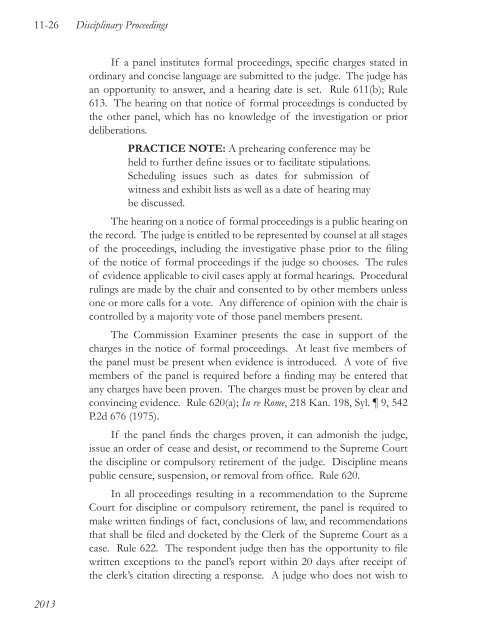CHAPTER 11 - Disciplinary Proceedings - Kansas Judicial Branch
CHAPTER 11 - Disciplinary Proceedings - Kansas Judicial Branch
CHAPTER 11 - Disciplinary Proceedings - Kansas Judicial Branch
You also want an ePaper? Increase the reach of your titles
YUMPU automatically turns print PDFs into web optimized ePapers that Google loves.
<strong>11</strong>-26 <strong>Disciplinary</strong> <strong>Proceedings</strong><br />
2013<br />
If a panel institutes formal proceedings, specific charges stated in<br />
ordinary and concise language are submitted to the judge. The judge has<br />
an opportunity to answer, and a hearing date is set. Rule 6<strong>11</strong>(b); Rule<br />
613. The hearing on that notice of formal proceedings is conducted by<br />
the other panel, which has no knowledge of the investigation or prior<br />
deliberations.<br />
PRACTICE NOTE: A prehearing conference may be<br />
held to further define issues or to facilitate stipulations.<br />
Scheduling issues such as dates for submission of<br />
witness and exhibit lists as well as a date of hearing may<br />
be discussed.<br />
The hearing on a notice of formal proceedings is a public hearing on<br />
the record. The judge is entitled to be represented by counsel at all stages<br />
of the proceedings, including the investigative phase prior to the filing<br />
of the notice of formal proceedings if the judge so chooses. The rules<br />
of evidence applicable to civil cases apply at formal hearings. Procedural<br />
rulings are made by the chair and consented to by other members unless<br />
one or more calls for a vote. Any difference of opinion with the chair is<br />
controlled by a majority vote of those panel members present.<br />
The Commission Examiner presents the case in support of the<br />
charges in the notice of formal proceedings. At least five members of<br />
the panel must be present when evidence is introduced. A vote of five<br />
members of the panel is required before a finding may be entered that<br />
any charges have been proven. The charges must be proven by clear and<br />
convincing evidence. Rule 620(a); In re Rome, 218 Kan. 198, Syl. 9, 542<br />
P.2d 676 (1975).<br />
If the panel finds the charges proven, it can admonish the judge,<br />
issue an order of cease and desist, or recommend to the Supreme Court<br />
the discipline or compulsory retirement of the judge. Discipline means<br />
public censure, suspension, or removal from office. Rule 620.<br />
In all proceedings resulting in a recommendation to the Supreme<br />
Court for discipline or compulsory retirement, the panel is required to<br />
make written findings of fact, conclusions of law, and recommendations<br />
that shall be filed and docketed by the Clerk of the Supreme Court as a<br />
case. Rule 622. The respondent judge then has the opportunity to file<br />
written exceptions to the panel’s report within 20 days after receipt of<br />
the clerk’s citation directing a response. A judge who does not wish to

















